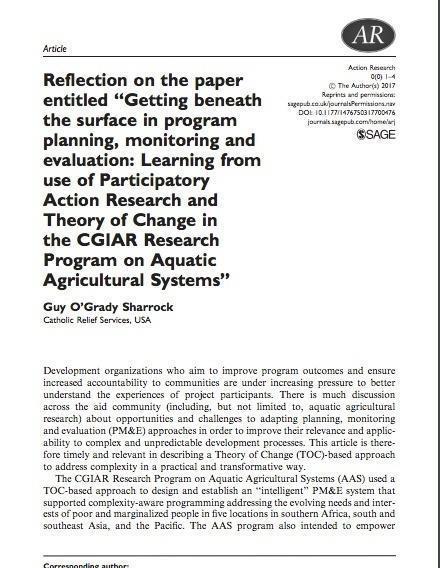Guy O’Grady Sharrock responds to the paper entitled ‘‘Getting beneath the surface in program planning, monitoring and evaluation: Learning from use of Participatory Action Research and Theory of Change in the CGIAR Research Program on Aquatic Agricultural Systems’’
 Development organizations who aim to improve program outcomes and ensure increased accountability to communities are under increasing pressure to better understand the experiences of project participants. There is much discussion across the aid community (including, but not limited to, aquatic agricultural research) about opportunities and challenges to adapting planning, monitoring and evaluation (PM&E) approaches in order to improve their relevance and applicability to complex and unpredictable development processes.
Development organizations who aim to improve program outcomes and ensure increased accountability to communities are under increasing pressure to better understand the experiences of project participants. There is much discussion across the aid community (including, but not limited to, aquatic agricultural research) about opportunities and challenges to adapting planning, monitoring and evaluation (PM&E) approaches in order to improve their relevance and applicability to complex and unpredictable development processes.
This article is therefore timely and relevant in describing a Theory of Change (TOC)-based approach to address complexity in a practical and transformative way. The CGIAR Research Program on Aquatic Agricultural Systems (AAS) used a TOC-based approach to design and establish an ‘‘intelligent’’ PM&E system that supported complexity-aware programming addressing the evolving needs and interests of poor and marginalized people in five locations in southern Africa, south and southeast Asia, and the Pacific
We invite you to learn more about this experience by reading our article HERE. Free 30-day access is available for this article beginning 24 May, 2017.
After you’ve had a chance to read this piece, please share your thoughts, ideas, or experiences with our community in the comments below so we can continue this discussion!
Abstract provided on behalf of the author, Guy O’Grady Sharrock
Guy O’Grady Sharrock is a senior technical advisor at Catholic Relief Services (CRS). He has worked for CRS since 2001, primarily as senior monitoring and evaluation advisor (2001–2013), then more recently focused on organizational learning. During this time, Guy has witnessed an expansion in M&E activity across 90+ country programs, and improvements in M&E consistency and quality. Evaluative thinking, monitoring as evaluation, and sense-making capacity-building are now particular interests, especially among frontline staff and communities. Guy is based in England and is a fellow of the Royal Geographical Society. He has master’s degrees in economics from Reading University and University College London.
- Making Public Deliberations Inclusive with Mixed Methods AR - October 26, 2020
- Participatory action research with Aboriginal Elders: Ngulluk Koolunga Ngulluk Koort project - October 12, 2020
- Bringing the relational self to ART: Interview with Dr. Yvonne Skipper - October 1, 2020
